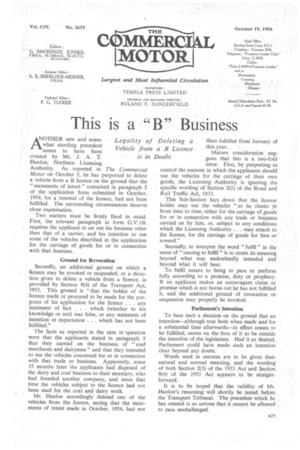This is a "B" Business
Page 35

If you've noticed an error in this article please click here to report it so we can fix it.
AIOTHER new and somewhat startling precedent seems to have been created by Mr. J. A. T. Hanlon, Northern Licensing Authority. As reported in The Commercial Motor on October 5, he has purported to delete a vehicle from a B licence on the ground that the " statements of intent" contained in paragraph 5 of the application form submitted in October, 1954, for a renewal of the licence, had not been fulfilled. The surrounding circumstances deserve close examination.
Two matters must be firmly fixed in mind. First, the relevant paragraph in form G.V.1B. requires the applicant to set out his business other than that of a carrier, and his intention to use some of the vehicles described in the application for the carriage of goods for or in connection with that business.
Ground for Revocation Secondly, an additional ground on which a licence may be revoked or suspended, or a direction given to delete a vehicle from a licence, is provided by Section 9(4) of the Transport Act, 1953. This ground is "that the holder of the licence made or procured to be made for the purposes of his application for the licence . . , any statement of fact . . . which (whether to his knowledge or not) was false, or any statement of intetrtion or expectation . . . which has not been fulfilled."
The facts as reported in the case in 'question were that the applicants stated in paragraph 5 that they carried on the business of "coal merchants and dairymen" and that they intended to use the vehicles concerned for or in connection with that trade or business. Apparently, some 15 months later the applicants had disposed of the dairy and coal business to their secretary, who had founded another company, and since that time the vehicles subject to the licence had not been used for the coal and dairy work.
Mr. Hanlon accordingly deleted one of the vehicles from the licence, saying that the statements of intent made in October, 1954, had not bten fulfilled from January of this year.., Mature consideration suggests that this is a two-fold error. First, by purporting to control the manner in which the applicants should use the vehicles for the carriage of their own goods, the Licensing Authority is ignoring the specific wording of Section 2(3) of the Road and Rail Traffic Act, 1933.
This Sub-Section lays down that the licence holder may use the vehicles "as he thinks fit from time to time, either for the carriage of,goods for or in connection with any trade or business. carried on by him, or, subject to any conditions. which the Licensing Authority . . . may attach to the licence, for the carriage of goods for hire or reward."
Secondly, to interpret the word " fulfil" in the sense of "ceasing to fulfil" is to strain its meaning beyond what was undoubtedly intended and beyond what it will bear.
To fulfil means to bring to pass or perform fully according to a promise, duty or prophecy. If an applicant makes an extravagant claim or promise which is not borne out he has not fulfilled it, and the additional ground of revocation or suspension may properly be invoked.
Parliament's Intention To base such a decision on the ground that an intention—although true both when made and for a substantial time afterwards—in effect ceases to be fulfilled, seems on the face of it to be outside the intentibn of the legislature. Had it so desired, Parliament could have made such an intention clear beyond any doubt.
Words used in statutes are to be given their natural and normal meaning, and the wording of both Section 2(3) of the 1933 Act and Section 9(4) of the 1953 Act appears to be straightforward.
It is to be hoped that the validity of Mr. Hanlon's reasoning will shortly be tested before. the Transport Tribunal. The precedent which he has created is so serious that it cannot be allowed to pass unchallenged.












































































































